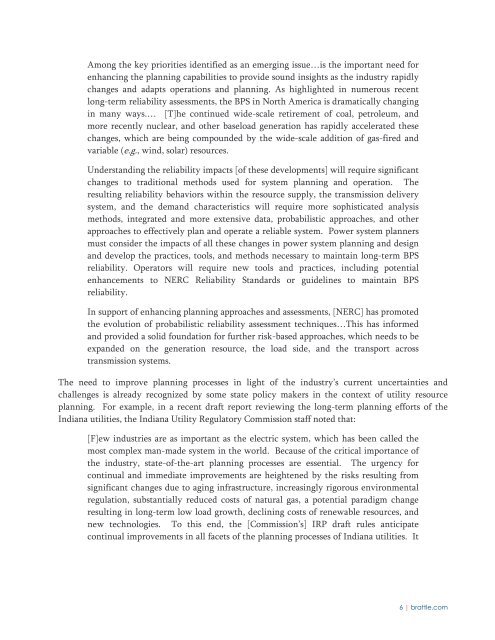THE BRATTLE GROUP
pvrbYG
pvrbYG
Create successful ePaper yourself
Turn your PDF publications into a flip-book with our unique Google optimized e-Paper software.
Among the key priorities identified as an emerging issue…is the important need for<br />
enhancing the planning capabilities to provide sound insights as the industry rapidly<br />
changes and adapts operations and planning. As highlighted in numerous recent<br />
long-term reliability assessments, the BPS in North America is dramatically changing<br />
in many ways.… [T]he continued wide-scale retirement of coal, petroleum, and<br />
more recently nuclear, and other baseload generation has rapidly accelerated these<br />
changes, which are being compounded by the wide-scale addition of gas-fired and<br />
variable (e.g., wind, solar) resources.<br />
Understanding the reliability impacts [of these developments] will require significant<br />
changes to traditional methods used for system planning and operation. The<br />
resulting reliability behaviors within the resource supply, the transmission delivery<br />
system, and the demand characteristics will require more sophisticated analysis<br />
methods, integrated and more extensive data, probabilistic approaches, and other<br />
approaches to effectively plan and operate a reliable system. Power system planners<br />
must consider the impacts of all these changes in power system planning and design<br />
and develop the practices, tools, and methods necessary to maintain long-term BPS<br />
reliability. Operators will require new tools and practices, including potential<br />
enhancements to NERC Reliability Standards or guidelines to maintain BPS<br />
reliability.<br />
In support of enhancing planning approaches and assessments, [NERC] has promoted<br />
the evolution of probabilistic reliability assessment techniques…This has informed<br />
and provided a solid foundation for further risk-based approaches, which needs to be<br />
expanded on the generation resource, the load side, and the transport across<br />
transmission systems.<br />
The need to improve planning processes in light of the industry’s current uncertainties and<br />
challenges is already recognized by some state policy makers in the context of utility resource<br />
planning. For example, in a recent draft report reviewing the long-term planning efforts of the<br />
Indiana utilities, the Indiana Utility Regulatory Commission staff noted that:<br />
[F]ew industries are as important as the electric system, which has been called the<br />
most complex man-made system in the world. Because of the critical importance of<br />
the industry, state-of-the-art planning processes are essential. The urgency for<br />
continual and immediate improvements are heightened by the risks resulting from<br />
significant changes due to aging infrastructure, increasingly rigorous environmental<br />
regulation, substantially reduced costs of natural gas, a potential paradigm change<br />
resulting in long-term low load growth, declining costs of renewable resources, and<br />
new technologies. To this end, the [Commission’s] IRP draft rules anticipate<br />
continual improvements in all facets of the planning processes of Indiana utilities. It<br />
6 | brattle.com


